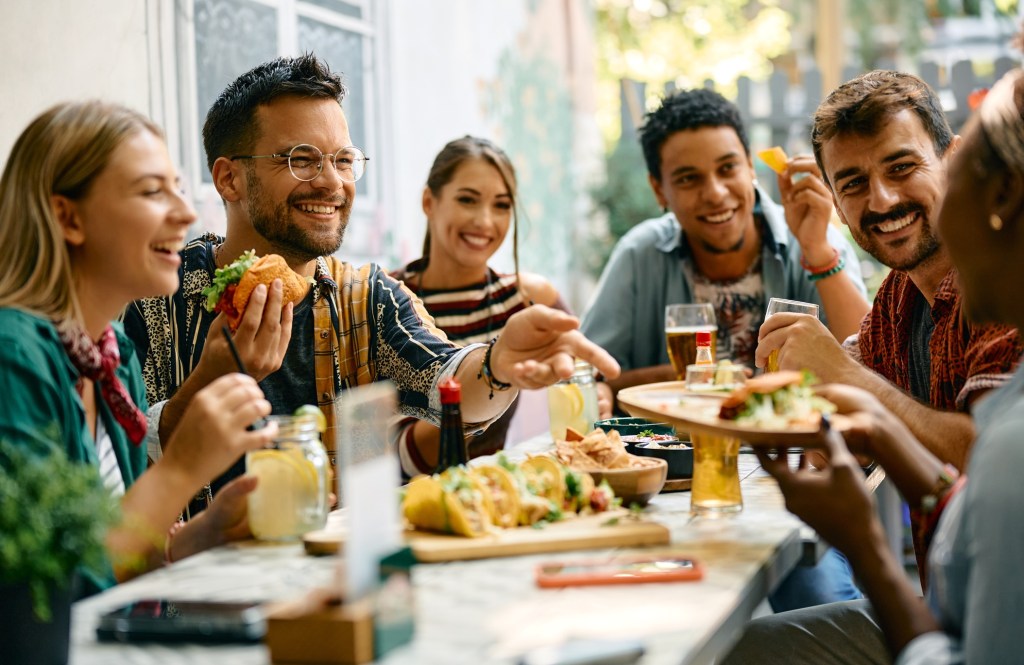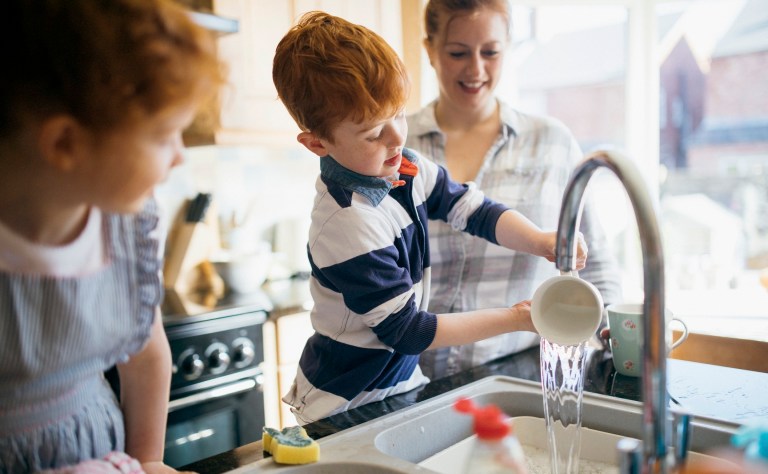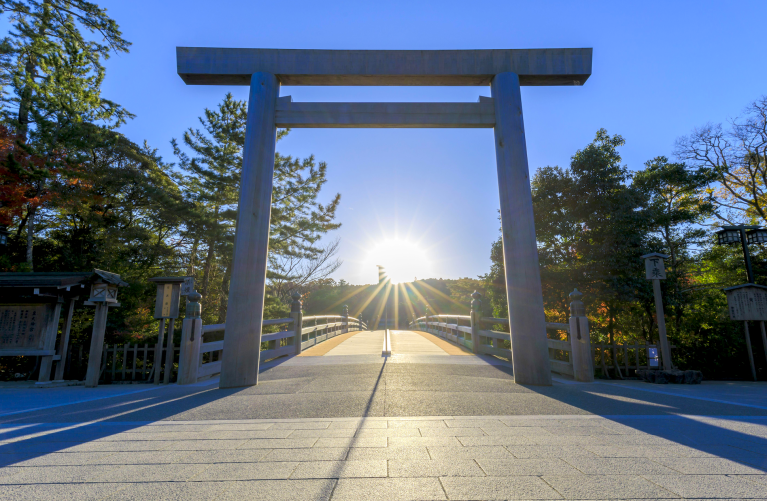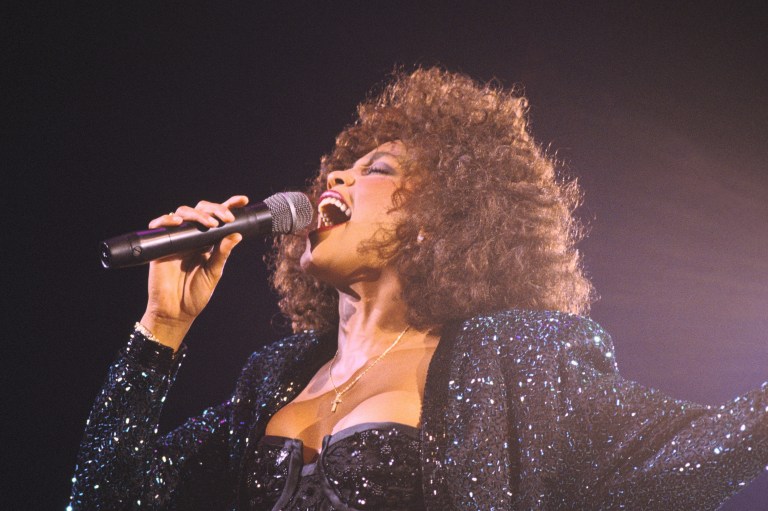Friends: We all need them. They can lift our spirits, offer support, and give us a sense of belonging. Research suggests they’re also crucial for health and well-being — people with strong friendships tend to be happier and live longer than those without. One meta-analysis found quality social ties are even more important than diet and exercise, and not having enough of them could be as detrimental as smoking cigarettes.
No matter how many friends are in your circle, you’re likely to have a few different types, each of which plays a different role, Marisa G. Franco, a psychologist and friendship expert, told Mind Body Green: “If we can treat each of these friendships differently, we can harness what’s best about them in a way that best works for us and the friendship.”
Here’s a look at different kinds of friendships and how they can enhance your life.
Workplace Friends

“Work friends keep our spirits up, validate our complaints about our job or industry, and provide much-needed predictability in our work lives,” Lauren Napolitano, a clinical psychologist, told Today.
A 2022 Gallup report showed that the importance of having a work bestie has increased since the COVID-19 pandemic, even with the rise in hybrid and remote work. Data gathered by the global research company has also indicated that people who have a work best friend are more likely to be productive, innovative, and willing to share ideas. Plus, those with workplace friendships have more fun on the clock and are less likely to get burned out, among other benefits.
Close Friends

Close friends are there for you through it all. They’re your biggest cheerleaders and trusted confidantes with whom you can comfortably be yourself. In these relationships, there’s mutual respect and a sense of comfort and security. You might call daily or go years without seeing each other but know you can always pick up where you left off.
“It’s a relationship where you can feel comfortable being yourself and sharing your innermost thoughts and emotions without fear of judgment or rejection,” clinical psychologist Annia Raja told Mind Body Green.
According to another clinical psychologist, Anjali Ferguson, these are the most important friendships for mental health. She explained to Today: “These relationships challenge us and support us simultaneously while helping us grow through validation and safety.”
Because these tight-knit relationships require time and energy to cultivate and maintain, most people only have a few. Research by leading friendship expert Robin Dunbar suggests around three to five is the sweet spot.
Lifelong Friends

Lifelong friends have been with you for years, usually from childhood or early adolescence. In a TikTok video, relationship expert Wendy Walsh explained that these people remind you to be authentic because spending time with them transports you back to your childhood.
They likely know your parents and siblings and understand how your family and environment influenced your development. Although you might not speak with them regularly, their depth of understanding can give you a sense of security in the friendship, Napolitano told Today. And as you age and navigate challenging life events, Ferguson added that the stability of these individuals can be particularly crucial.
Older Friends

Most people choose friends in their age range who share similar life experiences. However, people 10 years or more your senior may have more lived experience, enabling them to provide a broader perspective. Chances are, they’ll have lived through some of the same challenges you’re now facing and can offer valuable insights.
“Being exposed to ways of thinking that people in your immediate age group may not be exposed to is a big benefit of multigenerational friendships,” friendship expert Shasta Nelson told Well+Good.
Moreover, older adults can be incredibly inspiring. Whether they’ve amassed professional accolades, are living adventurously in their golden years, or sport their wrinkles and gray hairs with pride, their accomplishments and attitude may be a positive influence.
Younger Friends

Younger friends can offer fresh perspectives, too. For instance, young people tend to be more current on technology and popular culture, which can teach you new skills and broaden your horizons. This phenomenon, sometimes known as “reverse mentoring,” can benefit both parties, according to Well+Good. That’s because traditional mentoring — where an older person guides a younger counterpart — can co-occur and give the older friend a sense of purpose and fulfillment.
“Befriending somebody who’s younger and helping them walk through a life stage or experience that you have already gone through can foster closeness, and that can feel really good,” therapist and friendship expert Miriam Kirmayer told the outlet.
A younger friend can also provide a sense of vitality. Although age is just a number, and people can feel sprightly at any stage of life, younger people tend to be more energetic, which may be infectious and invigorating.
Friends of Convenience

Pals you meet through proximity — including roommates, neighbors, and yoga class buds — are considered friends of convenience. They may last a few months or a lifetime, but regardless, they’re essential.
“They can offer a sense of belonging or support during a period of adjustment or transition (which can be a much-needed stress reducer),” Ferguson said.
If these friends are associated with a particular hobby, all the better, as they could encourage you to continue pursuing your passion. A 2023 meta-analysis that included data from more than 93,000 older adults found that people with hobbies — or activities done for pleasure — reported being healthier, happier, and more satisfied with life.
“These friendships that are confined to certain circumstances tend to be less intimate than a more general friend who you know across different circumstances, but they do serve a role and serve a purpose such that, when we are in the setting in which we most interact with that friend, it improves our experience,” Franco told Mind Body Green.
Same Life-Stage Friends

In his oft-quoted poem, Brian A. “Drew” Chalker wrote that people are in your life for a reason, a season, or a lifetime. Relationships that occur for a “reason” fulfill a specific, immediate need, while those that last for a “season” can bolster you during a particular life stage. These relationships may not last a lifetime but are invaluable, nonetheless. Whether you’re heading off to college, getting married, going through a divorce, moving to a new city, or changing careers, these friends can empathize as they’re going through the same thing.
“We need friends who can support us and inspire us as they navigate the same challenges,” Napolitano told Today. “We learn from their mistakes and successes, and we feel that this kind of friend is uniquely invested in helping us navigate this chapter of life.”












